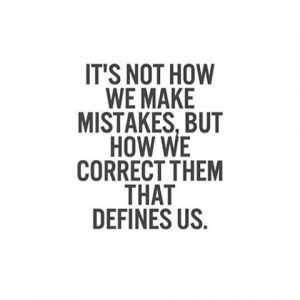 If you’re not having any success trying to shed those extra pounds, you might be making one or more of the common diet mistakes that sabotage your efforts. One of the biggest ones is failing to eat enough calories and using a fad diet. Dieting, whether it’s a fad diet or not, just doesn’t work. It’s not sustainable and eventually you go back to old eating habits, which put on weight in the first place. You also often feel hungry and deprived. Eating to few calories can actually slow your metabolism, making it even harder to lose weight. While you need to eat fewer calories than you burn, do it by eating whole foods and skipping the empty calories in processed and sugary food.
If you’re not having any success trying to shed those extra pounds, you might be making one or more of the common diet mistakes that sabotage your efforts. One of the biggest ones is failing to eat enough calories and using a fad diet. Dieting, whether it’s a fad diet or not, just doesn’t work. It’s not sustainable and eventually you go back to old eating habits, which put on weight in the first place. You also often feel hungry and deprived. Eating to few calories can actually slow your metabolism, making it even harder to lose weight. While you need to eat fewer calories than you burn, do it by eating whole foods and skipping the empty calories in processed and sugary food.
Is exercise part of your weight loss plan?
It should be if it isn’t. Not only does exercise burn extra calories, it boosts your energy and builds muscle tissue. Who wouldn’t love a little extra energy to get more accomplished throughout the day and still feel like doing something active when your work day ends. That means you’ll burn even more calories. Building muscle tissue is also important, since muscle tissue requires more calories than fat tissue does, boosting your metabolism and making weight loss even easier. If you’re not working out regularly, add it to your schedule and you’ll find weight loss easier.
Don’t be fooled by the label “low fat” or “no fat.”
Eating less fat may seem like a great idea when you’re trying to shed a few pounds, but it will backfire and make you gain weight. Even though it’s higher in calories per gram, it also makes you feel fuller for longer, so you’ll eat less. Since removing the fat also takes some of the flavor, manufacturers often add sugar to make the food taste better. That extra sugar adds up to extra calories and actually makes you hungrier, so you’ll eat even more than you would otherwise.
Check your diet for the amount of protein it contains.
Not only does protein make you feel fuller longer, it also helps to boost your metabolism. Lack of protein can affect how much muscle mass you have, too. By now you should realize that the more the better when it comes to muscle tissue. Studies show that eating protein can make a significant difference in weight loss. In one study, the subjects ate a diet with 30 percent of those calories from protein sources. Those people ate fewer calories than they did when they lowered that amount to 15 percent of their calories from protein.
- You can get too much of a good thing. While exercise can help you shed extra pounds, if you’re overdoing it, can stress your body. Stress hormones like cortisol add pounds around your middle.
- While exercise is important, so is the type of exercise you do. Aerobic exercise like running burns tons of calories, but they come from both lean muscle tissue and fat. The less lean muscle tissue you have, the harder it is to lose weight. Include strength building exercises in your workout that build muscles.
- Don’t forget the fiber. Sure, you probably know that fiber keeps you regular, so you don’t have a bloated belly, but did you know it can help you lose weight? It blocks the absorption of some calories while boosting your satiety level.
- If you think you’re eating less, but don’t track what you eat, you may be eating far more calories than you expected. Keeping a food diary can help you find out where your weaknesses are and just how many calories you’re really eating.
